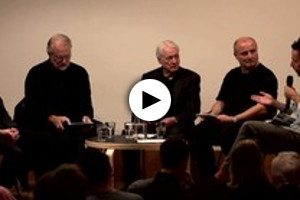Joseph Vogl: Franz Kafka, Friedrich Nietzsche und der rätselhafte Stammvater Israels und der Araber
Die Apokalypse des Abraham ist eine einzigartige, apokryphe (nicht in den offiziellen Heiligen Schriften enthaltene) Quelle in aramäischer Sprache. Sie ist heute nur erhalten in kirchenslawischen Abschriften. Sie zeigt den Stammvater Abraham als Initiator der „Aufklärung“. Täglich fährt er die Götzen seines Vaters zu einem Teich, um ihnen „den Mund auszuwaschen“. Die Götzen fallen ihm von Fahrzeug und zerbrechen. Wie ein Experimentator beobachtet der Stammvater die Szene. Wie sollen Götter, die sich nicht selbst reparieren können, uns das Heil bringen? So gelangt Abraham in dieser APOKALYPSE in mehreren Schritten zur Vorstellung vom „unsichtbaren Gott“.
Der Kulturwissenschaftler Prof. Dr. Joseph Vogl, bekannt durch sein Buch DAS GESPENST DES KAPITALS, kommentiert dieses eindrucksvolle theologische Dokument, von dem man sich wünschen würde, dass Luther es gelesen hätte.
Alle aktuellen Sendungen der dctp finden sie online in unserem ► Catch-up Service
Sehen Sie dazu auch auf dctp.tv:
► When the heavens still spoke to each other
 In late antiquity, Christianity, Judaism and Islam did not yet face each other across oppositional lines. The Christian Apocrypha, the Babylonian Talmud and the Quran all reveal spiritual plurality. How do the formative phases of the religions affect our modern consciousness?
In late antiquity, Christianity, Judaism and Islam did not yet face each other across oppositional lines. The Christian Apocrypha, the Babylonian Talmud and the Quran all reveal spiritual plurality. How do the formative phases of the religions affect our modern consciousness?
Following the film the role of religion in history will be discussed in a conversation between Director of the London School of Economics, Craig Calhoun, the LSE Chaplin Revd Dr James Walters and author and film director Alexander kluge, moderated by Gareth Evans, film curator at the Whitechapel Gallery. Panelists will compare the emergence of modern religions in late antiquity – when they were not yet set dogmatically and still spoke to one another – with their confrontations and transformations today.